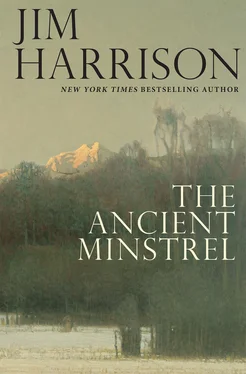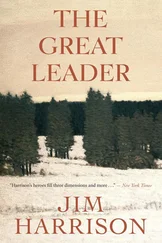Jim Harrison
The Ancient Minstrel
Some years ago when I was verging on sixty years and feeling poignantly the threat of death I actually said to myself, “Time to write a memoir.” So I did. Time told another story and over fifteen years later I’m still not dead, a fine surprise for a poet who presumed he’d die young in a pile on the house floor, or perhaps near the usual fountain in Rome, or withering to nothing in a garret in Paris torturously located above a bistro so I could smell food I couldn’t afford to buy. I choke on a fishbone I found in the garbage, and the violent coughing and hemorrhaging kill me by dawn, still sprawled in the alley after a night of chilly rain. The shivering likely kept me alive for the night. A lovely jogger in green shorts discovers me and stands above my head, leaning over and looking for life signs of which there are none except a flickering right eye. The left eye was blind since childhood. It occurrs to me that looking up at her winsome crotch I was born and am dying between a woman’s legs. How appropriate because this locale has drawn a fair amount of attention in my life.
I don’t regret waiting on illusions because that seems the fairness of living. In fact I spent a month trying to figure out whether I should call this novella “The Ancient Minstrel” or “The Ancient Mongrel.” Both are apt whether you are showing off for pay or doing your brilliant dog tricks for pay. Mongrels are especially similar to writers. The parentage of the arts is often lost to history, or the matter has evoked dishonesty. Who cares about your noble ancestry when all of the proof is on the page? I studied Dostoyevsky and Faulkner very hard but don’t see any evidence in my own work.
To be honest, which often I am not, when I began, my family insisted on being left out. My wife led the charge knowing altogether too well the fables of a writer. A friend, a successful novelist, had written a memoir that included information about his wife’s affairs, affairs which in fact didn’t exist but he included to absolve his own behavior. I admitted to myself that the same was not beyond me though I would veil it all as jest. My two married daughters were both at dinner and shouted in chorus, “Leave us out!” I felt near tears (from several drinks) and unfairly treated. I asked, “You don’t trust my taste?” to which I received a resounding “No.”
I decided to continue the memoir in the form of a novella. At this late date I couldn’t bear to lapse into any delusions of reality in nonfiction.
He went in a door and out another one ten feet away. It had been an old railroad flat he had remodeled, tearing down walls and painting. He liked the two doors close together. It gave him a sense of choice otherwise missing in his aging life.
Others who had remodeled railroad flats had stupidly closed off the extra door pretending it had never existed. He drove his neighbor in a prim bungalow quite crazy when he had a whim and circled in and out of his two doors. The neighbor was a retired academic, a delightfully bright codger who loved to speak vulgarly after a lifetime of propriety. The neighbor would open a fine wine he could afford on his generous retirement and wave him over to share it. He always went, even after he joined AA to preserve his marriage. He found out that fine wine encouraged a taste for fine wine and never precipitated a binge. If you drank half a bottle of Ducru-Beaucaillou you wanted more of it and nothing else, certainly not the rawness of whiskey or bilious beer.
He was what they called an “award winning poet,” at least that was what his publisher called him on book jackets, though in fact he had never heard of any of the awards before he received them. So much for the immortality of poetry. He had even looked up the Pulitzer in the World Almanac at a doctor’s office and been quite startled to see how many twentieth-century names had been forgotten. Meanwhile over a good Bordeaux his academic geezer neighbor would say, “Ontogeny recapitulates phylogeny” as if it were an obesity joke over which he chortled deeply. He himself could remember saying it in a coffee house before he flunked out of graduate school. His failure was due to “arrogance,” the department chairman said. Young poets, even before they wrote a poem, tended to be prideful rather than properly self-effacing graduate students. Anyway, the department managed to grant him his master’s after he published his first book of poems with an honored New York publisher. No one from the department had ever done that before. They were proud of him but not to the point where they would allow him to enroll in their Ph.D. program. Years more of him strutting the halls was an idea none of these fustian gentlemen could bear.
He and his wife weren’t divorced but she lived a dozen miles out in the country outside Livingston, Montana, on a small farm with a big house. It had been her idea to get a house in town for becoming older and she was tired of taking care of such a large farmhouse of 3,800 square feet. He had also slipped on drinking which he had been able to manage in his early sixties.
He would take a chance and drive out at least twice a week and play with the dogs, often a disappointing experience because it had been quite warm and he would get there and be met wildly by the dogs but after a few minutes of play they’d settle back to sleeping on the thick grass of the lawn. He wanted them to play like they did as pups. The fact of the matter was that they were no longer pups. At ten they were about the same age in dog years as his own seventy. He slept in his studio when he came out to the farm, in a small cabin where he did his writing on the property near the big house. It wasn’t elegant but simply workable.
He was taking a chance driving because he no longer had a driver’s license. He had thought many times that the end of his rational marriage had come when they took his driver’s license away. He was furious because it had been a mistake. He had stupidly admitted to the state cop that he had recently had spinal surgery. The cop asked if he was on narcotic pain medication and he clearly said, “No,” but wasn’t believed. As a matter of fact the first weeks after his surgery he had taken OxyContin but stopped despite the pain in his spine because the drug made his writing slurred and goofy. He couldn’t write that way, not even in his journal which was frequently goofy all by itself.
He had also suffered from shingles for nearly three years though when the big sores subsided it was called postherpetic neuralgia. Whatever it was called it was plainly a double whammy about which nothing could be done medically. He had learned that doctors ignored shingles as an unprofitable disease until they had it themselves. There were no big fund-raisers for shingles. At the Department of Motor Vehicles office he gave a bravura performance and they kept his license when he handed it over. “Give it back,” he yelled.
Anyway, he had sent the governor an imprudent letter saying that he had written Legends of the Fall, his best-known book, and he needed to drive and explore new places in order to write and make a living. He couldn’t very well sit home and write “Legends of the Yard.” The letter didn’t do any good although eventually he proved himself deserving and was able to drive again.
He had expected the trail into aging to be uneventful. On the contrary, who had ever heard of a white, Christian gentleman like himself losing his driver’s license and sitting under a pine tree rather than driving to a friendly bar in town? Which of course is what he didn’t need, a bar with old friends. He hated to think of the time and energy he had spent in a long life thinking about quitting smoking and drinking for the obvious health reasons. He had intermittently, briefly of course, been a health nut in his life. Once when they still lived in Michigan he lost twenty-five pounds in two months by walking four hours every morning, stopping for a rare cigarette, counting birds he liked, walking places in the Upper Peninsula where he had never walked before. The unknown always beckons. Early settlers always wondered what was over the next hill other than other hills. The vaunted reputation of Daniel Boone came from how thoroughly he had covered the landscape. He saved a village of starving people by going out and shooting a combination of ten deer and bears in one day, enough to feed everyone for a week.
Читать дальше












